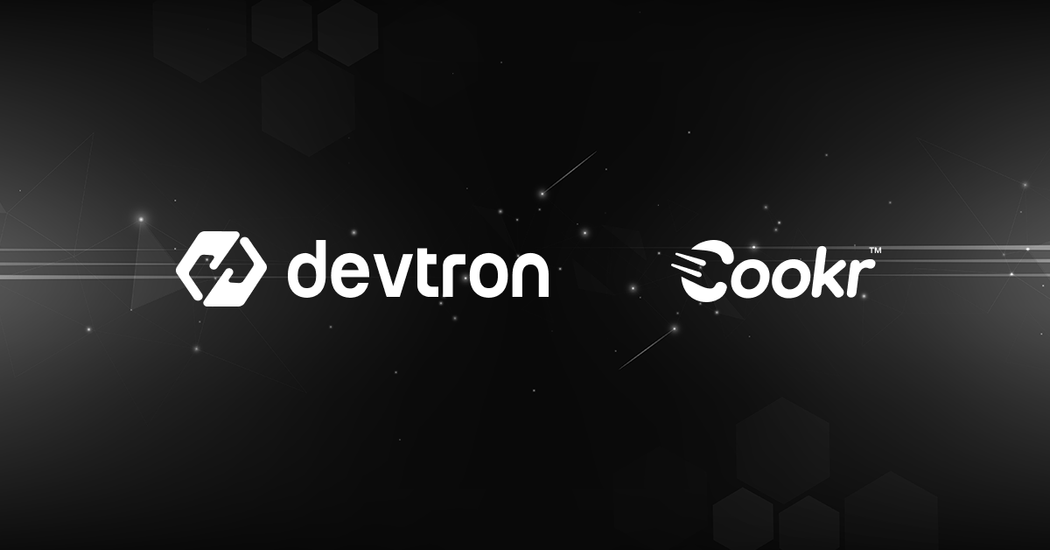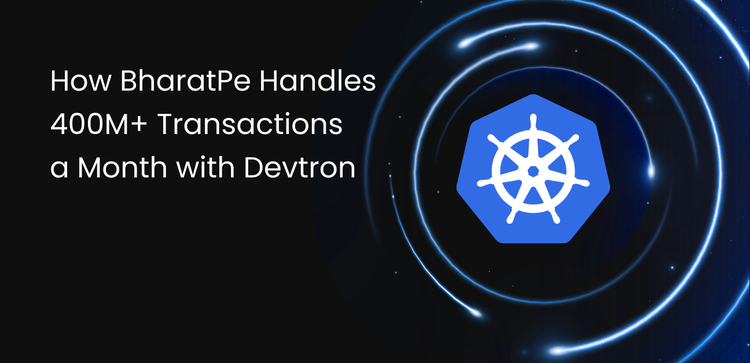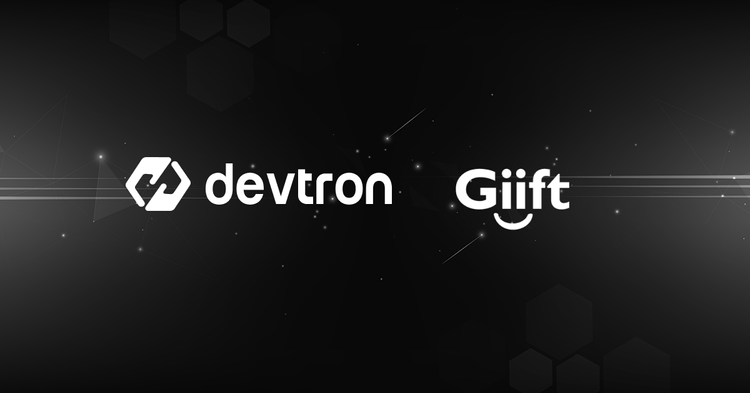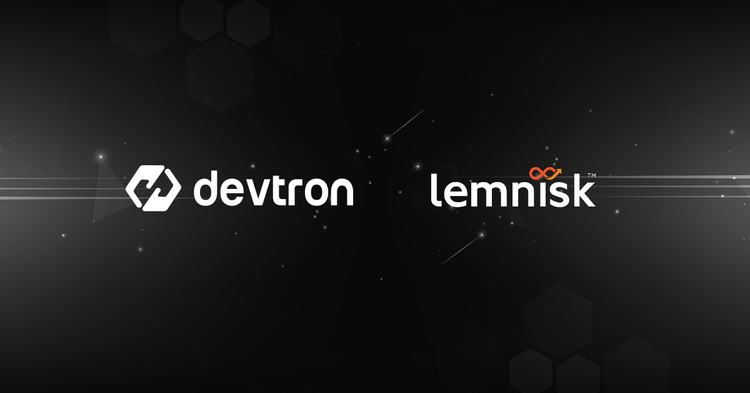Achieved Milestones
- Build Time Reduced by 70%
- Time to market Reduced by 60%
- Automation End-to-End CI/CD Pipelines
- Implemented GitOps Practises from Day 1 with Devtron
- DevOps Productivity Improved by 40%
- Enabled Developer Self-Serve Model
About the Company
Cookr is an early-stage food tech startup focused on transforming the food industry in India by building an e-commerce marketplace that provides a variety of healthy alternatives to restaurant-delivered food. The startup collaborates with skilled home cooks to deliver homemade meals directly to customers, offering a unique dining experience while simultaneously fostering entrepreneurship by enabling home cooks to generate primary livelihoods for their families.
Recognizing the importance of food safety, Cookr ensures that all partner cooks are FSSAI registered. Additionally, the startup leverages cutting-edge technology to create a scalable platform that facilitates seamless collaboration between cooks, customers, and delivery partners.
Committed to making healthy and delicious homemade food easily accessible, Cookr continues to innovate and enhance its offerings to meet customer needs efficiently.
Background
As an early-stage food tech startup experiencing rapid growth, managing Kubernetes-native CI/CD pipelines became increasingly challenging. With only one DevOps engineer overseeing the entire infrastructure and deployment process, ensuring efficiency and scalability was a major concern. While the team had successfully transitioned from manual servers to Kubernetes to enhance operational agility, this migration introduced its own complexities.
Before adopting Devtron, Cookr relied on Jenkins for CI/CD, which frequently caused pipeline failures, slowing down the development and deployment cycles. Additionally, manual deployment processes, troubleshooting, and granting access to Kubernetes environments posed significant operational bottlenecks. These inefficiencies hampered productivity and created dependencies that restricted the development team's autonomy. By leveraging Devtron, the startup was able to streamline operations, establish a self-serve model for developers, and significantly enhance productivity.
Challenges Faced
While Cookr initially adopted Kubernetes and configured CI/CD using Jenkins, the setup came with significant hurdles that hindered the efficiency of both DevOps teams and developers. Managing Jenkins in a Kubernetes environment often led to complex configurations, slow pipeline execution times, and difficulty scaling pipelines as the team grew. Additionally, Jenkins' lack of native integration with Kubernetes-specific resources meant developers faced manual steps and workarounds, leading to delays and more room for error.
Furthermore, as early-stage startup with limited resources, managing the complexities of Kubernetes became overwhelming. Ensuring system reliability, scaling infrastructure, and maintaining security without dedicated personnel for each task added to the pressure. As a result, Cookr's DevOps team found themselves spending more time on managing the Kubernetes environment and less time focusing on innovation and value-added work.
Here are some of the key challenges Cookr faced:
- Non-Cloud-Native CI/CD: The startup was using Jenkins, which was not optimized for cloud-native deployments.
- Image Build Issues: Building container images was complex and time-consuming.
- High Build Time for Concurrent Builds: Running multiple builds in parallel led to increased build times and many of times pipeline failures.
- Frequent Pipeline Failures: Unstable CI/CD pipelines caused disruptions in the release cycle.
- Developer Dependency on DevOps: Developers relied heavily on DevOps for deployments and troubleshooting since developers are not very comfortable with Kubernetes.
- Multiple Third-Party Tools: Managing various tools required frequent context switching and overhead. Additionally, it is difficult to configure and upgrade individual tools, bringing in the maintenance overhead.
- Complex Access Management: Granting access to Kubernetes clusters and resources was cumbersome, involving IP whitelisting and jump servers. Everything was manual and the command line was being used which is again not a forte of developers to learn kubectl commands.
- Helm Chart Management: Managing Helm charts requires additional effort and expertise. Installations and upgrades with helm-cli are cumbersome, not giving clear visibility of workload status, rollback configuration, and much more.
- Lack of Notifications: There was no automated notification setup for pipeline failures and deployments.
Solution: Devtron Platform
With limited resources and only one DevOps engineer on the team, Cookr needed an efficient way to streamline its CI/CD pipelines and manage the scaling of Kubernetes applications without compromising system reliability. Devtron became the perfect solution, enabling Cookr to overcome the challenges posed by Kubernetes and Jenkins helping them to accelerate their deployments, without the need of much manpower.
Key Features Leveraged
- Kubernetes-native CI/CD: Devtron’s CI/CD pipeline, designed specifically for Kubernetes, replaced Jenkins and significantly improved deployment efficiency.
- Infinite Parallel Builds: With Devtron, the startup achieved true parallelization, reducing build times by 70% even when running multiple builds concurrently.
- Application Metrics: Developers gained real-time visibility into application performance, leading to proactive issue resolution and better reliability.
- Helm Lifecycle Management: Managing Helm charts became effortless, enabling smooth version control and automated deployments.
- SSO & RBAC: Devtron’s Single Sign-On (SSO) and Role-Based Access Control (RBAC) simplified access management, eliminating the need for manual kubeconfig configurations.
- Troubleshooting & Debugging: With built-in debugging tools, developers could quickly identify and resolve issues without depending on DevOps.
- Integration with Cloud-native Tools: Devtron integrated seamlessly with the startup’s existing cloud-native stack, reducing the need for multiple third-party tools.
- Resource Browser: The Resource Browser enabled the DevOps engineer to monitor and manage EKS clusters efficiently without manual interventions.
Devtron provided Cookr with a single pane of glass for managing configurations, significantly simplifying and streamlining the process. This centralized approach made it easier to oversee both pipeline and application configurations, reducing complexity and improving efficiency. By leveraging Devtron's capabilities, Cookr was able to scale operations on Kubernetes more effectively, ensuring consistent and automated management of infrastructure and deployments, all from a unified interface.
Key Results
The key features of Devtron transformed the way they do devops and helped Cookr scale horizontally without worrying about hiring or setting up a dedicated team of DevOps. By adopting Devtron, the startup achieved:
- 70% Reduction in Build Time: Faster builds led to increased development velocity.
- 60% Decrease in Time-to-Market: Accelerated releases improved business agility.
- 40% Increase in DevOps Productivity: The single DevOps engineer could manage the entire CI/CD pipeline with ease.
- Self-Serve Deployment Model: Developers could deploy applications independently, reducing bottlenecks
~ said Santosh Sivan, DevOps Engineer at Cookr
Conclusion
The adoption of Devtron by Cookr, an early-stage food tech, showcases how even small teams can efficiently manage large-scale Kubernetes deployments. By eliminating inefficiencies, enabling self-serve deployments, and integrating seamlessly with cloud-native tools, Devtron empowered them to innovate faster and scale seamlessly. Whether you have a large DevOps team or a single engineer managing everything, Devtron ensures a smooth, hassle-free Kubernetes-native CI/CD experience.






